

What Causes Stress at Work? Sources of Stress at Work. Work Stress As we have studied so far in this chapter, we can experience a number of possible stressors.
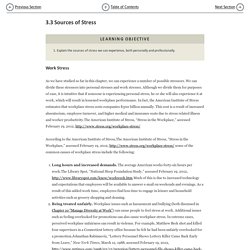
We can divide these stressors into personal stresses and work stresses. Although we divide them for purposes of ease, it is intuitive that if someone is experiencing personal stress, he or she will also experience it at work, which will result in lessened workplace performance. In fact, the American Institute of Stress estimates that workplace stress costs companies $300 billion annually. This cost is a result of increased absenteeism, employee turnover, and higher medical and insurance costs due to stress related illness and worker productivity.
According to the American Institute of Stress, some of the common causes of workplace stress include the following: Long hours and increased demands. Causes and Management of Stress at Work. Top Causes of Stress at Work. Symptoms of Stress. 4 workplace stress ayers mngt wow webmagazine. 7 Alarming Signs You're Burned Out From Work Stress. 20 Warning Signs You're Burned Out at Work. Work stress and depressive symptoms in older employees: impact of national labour and social policies. Stressed Workers in a Stressful Environment. Work related Stress in GB. 60% of Singaporean staff experience above average stress levels. Are Singaporean employers doing enough when it comes to health and well-being programmes?
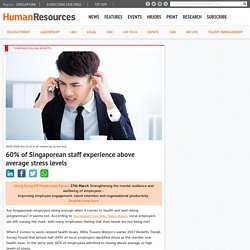
It seems not. According to new research from Willis Towers Watson, local employers are still missing the mark, with many employees feeling that their needs are not being met. When it comes to work-related health issues, Willis Towers Watson’s earlier 2017 Benefits Trends Survey found that almost half (44%) of local employers identified stress as the number one health issue. In the same vein, 60% of employees admitted to having above average or high levels of stress. Despite this, the survey revealed only 27% of employers are actually taking action to reduce work-related stress. A whopping 92% of working Singaporeans are stressed – and women are prioritising families over themselves, study finds. Pexels If you’re feeling stressed at work, you’re not alone.
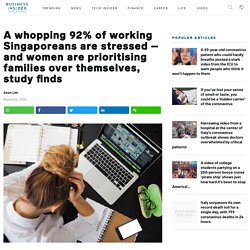
A vast majority of working Singaporeans are under stress, and women in particular feel that it’s less manageable, a survey has found. In the 2019 Cigna 360 Well-Being Survey, a whopping 92 per cent of working Singaporeans report feeling stressed, higher than the global average of 84 per cent. Of this, 13 per cent say their stress is unmanageable, which is on par with the global average, according to the study which surveyed a total of 13,200 online interviews in 23 markets, including 502 residents in Singapore.
And stress doesn’t go undetected in the workplace. Read also: 6 in 10 Singaporeans admit that they don’t leave work on time just to ‘show face’ Noticing colleagues’ stress in turn makes respondents more self-aware, it seems. 30 per cent of respondents feel more conscious about managing their own stress upon seeing others stressed at work. Women prioritise families over themselves. Death by Overwork. Japan is facing a 'death by overwork' problem — here's what it's all about, Business Insider - Business Insider Singapore. Japan's work culture is so intense, people in the 1970s invented a word that translates to "death by overwork.
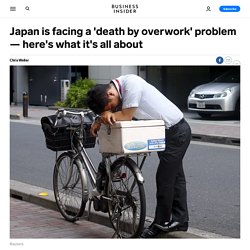
""Karoshi," as it's known, involves employees committing suicide or suffering from heart failure and stroke because of long work hours.The Japanese federal government has taken steps to reduce karoshi cases, but experts fear the measures don't go far enough. Ever since the late 1970s, Japan has had a word to refer to people dying from spending too much time in the office: karoshi. The literal translation is "death by overwork. " The latest employee death determined to be karoshi was 31-year-old journalist Miwa Sado. She reportedly logged 159 hours of overtime in one month at the news network NHK, before dying of heart failure in July 2013.
Her death was just recently announced as karoshi in early October 2017. Before that, 24-year-old Matsuri Takahashi worked 105 hours of overtime in a month at the Japanese ad agency Dentsu. Karoshi: How overwork in Japan killed Miwa Sado, and hundreds like her - Insider. Miwa Sado, 31, died after working more than 150 hours in overtime in a month.Her death has been classified as "karoshi" — death by overwork.Her parents recently spoke out in the hope of preventing more deaths.Experts attribute karoshi to Japan's toxic work culture and rigid labor market.The government is trying to halt the trend, but has yet to get very far.
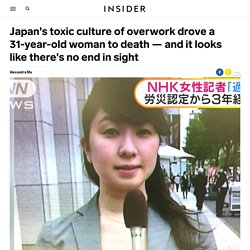
On July 25, 2013, Miwa Sado was found dead in her Tokyo apartment, clutching her mobile phone. Sado, a reporter for Japan's national broadcaster NHK, had died from congestive heart failure — meaning her heart had grown so weak it couldn't pump enough blood round her body. She was 31. NHK revealed Sado's death for the first time earlier this month, noting that the journalist's parents initially wanted to keep the death private. The labour office told Asahi: "[Sado] was under circumstances that she could not secure enough days off due to responsibilities that required her to stay up very late. Why Are The Japanese Dying Of Overwork? Health Problems due to Long Working Hours in Japan: Working Hours, Workers’ Compensation (Karoshi), and Preventive Measures.